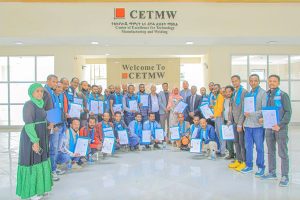
Article 25(1) of the Universal Declaration of Human Rights (UDHR) states that “everyone has the right to a standard of living adequate for the health and well-being of himself and his family, including the right to adequate food, clothing, housing…” However, contrary to this, ending hunger and achieving this right remains a major challenge, as hunger continues to affect millions of people around the globe. Despite efforts, hundreds of millions still experience hunger, with many facing severe levels of food insecurity.
The 2024 Global Hunger Index (GHI), released on October 10th, reaffirms this bitter truth. The report reveals that nearly one in 11 people worldwide go to bed hungry each night, and the level of hunger in 42 countries is dire, even at an alarming rate.
The problem is driven largely by conflict, changes in the climate and increases in extreme weather, food waste as well as deep-rooted inequality.
However, the pace made to address this challenge seems to be very slow, with minimal improvement since 2016. Persistent inequalities, widespread armed conflicts, worsening climate impacts, skyrocketed domestic food prices, economic downturns, and debt crises in many countries are some cases, according to the report.
Sadly, at the current rate of progress, at least 64 countries, or half of the countries mentioned in the report, will not reach the goal of reducing hunger by 2030—let alone achieving Zero Hunger. If the current trends continue, low hunger levels may not be reached until 2160, more than a century from now.
As 2030 is around the corner, the target year for attaining the UN Sustainable Development Goals, the prospects of meeting Goal 2: Zero Hunger is increasingly intimidating. Progress against hunger has slowed to a troubling degree owing to a barrage of successive and overlapping challenges that disproportionally hit the world’s poorest nations and people hardest, deepening existing structural inequalities, the report highlighted.
According to the report, unless more works are done in partnership and countries have done their assignments meritoriously, meeting the SDGs is impracticable. Thus, strengthening cooperation and collaboration is of critical importance today than before is much needed; because the issue needs coordinated efforts from actors across the globe.
In fact, even if coordination and cooperation are of greater importance, each country should work on its assignments and strive to ensure food security within its territories. They need to work focusing on ways how to increase product and productivity, conserve natural resources, and combat climate change, as well as create job opportunities for their young people.
In this regard, Ethiopia has been working committedly and aggressively over the years. The “Green Legacy Initiative”, which was introduced to restore and rehabilitate degraded lands and preserve natural resources and initiatives such as ‘Made in Ethiopia’ and the agricultural initiative- the summer wheat production campaign, designed to increase wheat production during the summer season using irrigation thereby satisfy internal needs, and export wheat, are demonstrating remarkable outcomes.
This, in turn, has made the country a model for other countries in its effort to realize food self-sufficiency, earned it a reputation, and enhanced its status in the energy exerted to attain food self-sufficiency at the national level. Prime Minister Abiy Ahmed has also been awarded the prestigious FAO Agricola Medal for his leadership, political commitment, and passion for ensuring food security and nutrition in Ethiopia.
However, a single country’s effort cannot avert this global challenge; it demands collective efforts and collaboration with international actors.
With this in mind, a three-day conference, ‘World Without Hunger’ conference which deliberated on ways to meet the goal of ‘Zero Hunger’ was conducted from November 05 to 07, 2024 under the theme “Challenges and Solutions to Combat Hunger and Food Security Issues.”
The conference was organized by the United Nations Industrial Development Organization (UNIDO), the Government of Ethiopia and the African Union (AU) with technical assistance of the Food and Agriculture Organization (FAO), here in Addis Ababa.
The reason that Ethiopia was nominated to organize the conference was its commitment and energy to realize food self-sufficiency and achieve the goal of Zero Hunger.
In his remarks at the conference, Prime Minister Abiy Ahmed said that Ethiopia has made significant progress towards achieving food security for its citizens. Mainly, over the past six years, focusing on agricultural transformation and productivity, the country has enabled to double its cultivated land.
“Our emphasis on high-value industrial crops is yielding promising outcomes. We have made significant gains in drought-resistant crops like wheat, teff maize and sorghum.”
However, the ongoing challenges persist throughout the Ethiopian food system, spanning production, distribution and consumption. Production diversity and productivity are constrained by limited access to essential inputs, including fertilizers, seeds and modern agricultural technologies, he added.
Additionally, the Premier highlighted population growth and agricultural intensification that have led to soil erosion, land degradation and deforestation over time.
Responding to these issues, Abiy stressed the need for reducing agricultural greenhouse gas emissions while simultaneously building resilience to ongoing climate change and extreme weather events.
To this effect, the Prime Minister pointed out Ethiopia’s remarkable achievements through the Green Legacy Initiative (GLI).
“Transformative initiatives such as our Green Legacy program, launched in 2019 aimed at combating climate change and enhancing agricultural productivity. To date, we have planted 40 billion seedlings, with a target of 50 billion by 2026 expanding our forest cover by more than 6 percent within five years.”
Prime Minister Abiy also appreciated UNIDO for taking the initiative to organize such an important event.
Kenya’s President William Ruto, also said that the interconnected crises of inequality, poverty, conflict, and climate change as intensifying factors that make addressing global hunger a critical challenge of our time.
“In a world marked by growing inequality, widespread poverty, conflict, and climate disruption, the urgency to end hunger and ensure food security for our rapidly expanding populations has never been more urgent.”
According to him, hunger is not simply a matter of missed nourishment but a tragic force that deteriorates health, diminishes productivity, erodes future opportunities, and threatens the fundamental human promises of freedom and well-being.
Highlighting the need to urgently act to end hunger and ensure food security, the President urged global leaders and institutions to maximize the potential of agricultural and food systems to nourish the world’s population urgently.
“Without a radical strategic shift, we risk failing in our commitment to end hunger by 2030,” President Ruto underscored.
He also accentuated the importance of agricultural education, highlighting that training farmers to be innovative, efficient, and adaptable is essential to counter the impacts of climate change.
The World Without Hunger Conference, themed “A World Without Hunger is Possible,” brought together over 1,500 key stakeholders—including heads of state, government officials, UN agencies, private sector representatives, and civil society leaders—to address one of humanity’s most pressing challenges.
UNIDO indicates that a world without hunger initiative needs investment of 50 billion USD in the coming ten years.
The opening session was attended by Prime Minister Abiy Ahmed (PhD), UNIDO Director–General Gerd Muller, Crown Prince of Abu Dhabi Sheikh Khaled bin Mohamed bin Zayed Al Nahyan, African Union Commission Chairperson, and other high-level stakeholders including Heads of State/Government, Ministers, UN agencies, the private sector, financial institutions, donor community, DFI/IFI, civil society, non-governmental organizations, academia, and media, it was learnt.
BY STAFF REPORTER
THE ETHIOPIAN HERALD SATURDAY 9 NOVEMBER 2024





